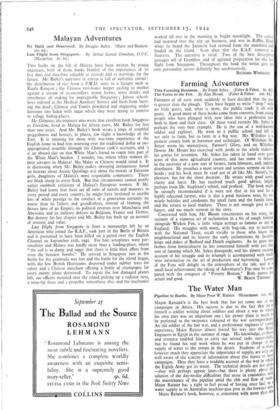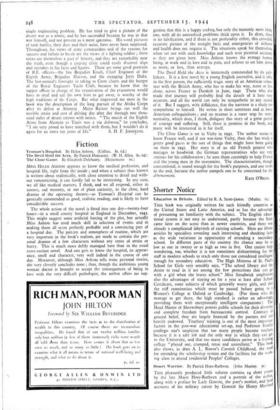The Water Man
Pipeline to Battle. By Major Peter W. Rainier. (Heinemann. los. 6d.) MAJOR RAINIER'S is the best book that has yet come out of the campaigns in Africa. His success is due to the fact that he it himself a soldier writing about soldiers and about a war in which his own part was an important one ; his penny plain is much to be preferred to the twopence coloured of the war correspondents. An old soldier of the last war, and a professional engineer of varied experience, Major Rainier almost forced his way into the Royal Engineers in Egypt in the summer of 1940. His knowledge, coolness and resource enabled him to carry out several tasks successfully, but he found his real work when he was put in charge of the supply of water to the troops in the desert. Students of warfare, however much they appreciate the importance of supply, are only too well aware of the scarcity of information about this aspect of most campaigns. Here they have a readable account of the way in which the Eighth Army got its water. The technical details are not giveri —they will perhaps appear later—but there is plenty about the, solution of the day-to-day difficulties that arose in connection vign the maintenance of the pipeline amid the ebb and flow of bank. Major Rainier has a right to feel proud of having once laid on 1 water supply- to an Australian machine-gun post in the forward are.
Major Rainier's book, however, is concerned with more than tho
single engineering problem. He has tried to give a picture of the desert war as a whole, and he has succeeded because he was in that war himself, and not present as a mere spectator. His word pictures of tank battles, their dust and their noise, have never been surpassed. Throughout, his views of army commanders and of the reasons for success and failure in Wale are the views of a fighting soldier ; these views are themselves a part of history, and they are remarkably near the truth, even though a carping critic could easily discover slips and mistakes in his facts and figures. There are some good portraits of R.E. officers—the late Brigadier Kisch, Chief Engineer of the Eighth Army,- Brigadier Hutson, and the engaging Jerry Duke. The last-named's foresight in taking to Crete charts and the bargee of the Royal Engineers Yacht Club, because he knew that the sapper officer in charge of the organisation of the evacuation would have to steal and sail his own boat to get away, is worthy of the high traditions of the Corps. But what impressed me most in the book was the description of the long pursuit of the Afrika Corps after its defeat at Alamein. Major Rainier brings out well the terrible strain and cost of driving day after day through two thou- sand miles of desert strewn with mines. "The march of the Eighth Army from Alamein to Tunis was a via dolorosa," he concludes, " I am very proud to have marched with them, but I wouldn't do it again for an extra ten years of life." S. H. F. JOHNSTON.























 Previous page
Previous page